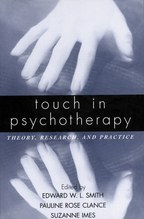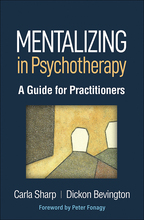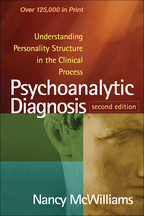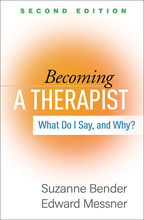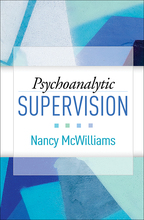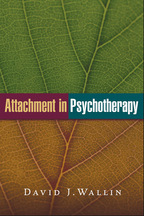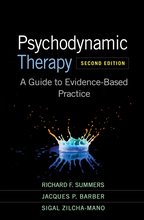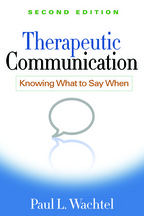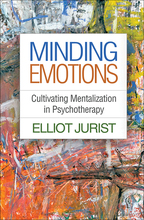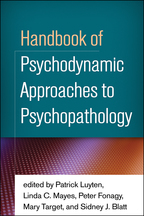Touch in Psychotherapy
Theory, Research, and Practice
Edited by Edward W. L. Smith, Pauline Rose Clance, and Suzanne Imes
Paperback
Paperback
orderFebruary 15, 2001
ISBN 9781572306622
Price: $43.00 248 Pages
Size: 6" x 9"
Copyright Date: 1998
“...I am very glad to have this book available for my students and for verbal-oriented therapists who have questions about the use of touch....I recommend this book to Gestalt therapists and others interested in having an informed understanding of touch in psychotherapy.”

—Gestalt Review
“Smith, Clance and Imes deliver what the title of the book promises....Each section has something to offer the reader....The editors did an excellent job of seeing to it that material is not repeated from chapter to chapter.”

—The National Organization on Male Sexual Victimization
“Case studies...Are valuable reading....They include cross-gender and especially cross-ethnic or -racial counseling....Smith and his associates have presented evidence that may be a landmark in progress from talk therapy toward bodymind healing. They have broken ground....I recommend this book to anyone who hesitates to touch.”

—AHP Perspective (Association for Humanistic Psychology)
“The text explores boundaries and makes good use of some remarkable works by Spitz, Harlow, and long-accepted theories about the relation of touch and development....This thought-provoking book provides a wealth of perspectives and guidance. It will be as useful to neophyte practitioners as to supervisors.”

—Readings
“This masterful and comprehensive compendium of theory, research and practice is sure to edify psychotherapists of all persuasions and levels of experience. In Touch in Psychotherapy, old pros provide timeless wisdom about a previously perplexing topic.”

—Jeffrey K. Zeig, PhD, Director, The Milton Erickson Foundation
“Touch in Psychotherapy sheds a bright light on a crucially important dynamic in therapy, that of touch. An honest discourse on this subject is many years overdue and this book is it. Readers are offered a conscientious and critical perspective on touch through the prisms of developmental, theoretical, ethical, research-based, and practice points of view. The contributors have identified and dealt objectively with the key problematic concepts of touch including how to make ethical decisions, how to factor in therapist and patient variables, and how to evaluate diagnostic, process, and therapeutic factors to promote effective therapy. This book presents the reader with a sensitive, respectful, critically objective picture of the role and function of touch in psychotherapy. A bonus to the reader is the sense of richness, dynamic movement, and exhilaration we can still experience as psychotherapists. Psychotherapy will continue to flourish as long as we nurture a pioneering mentality for critical exploration in underdeveloped, misunderstood, or controversial dimensions of our work. These authors are pioneers.”

—Linda Campbell, PhD, University of Georgia, Center for Counseling and Personal Evaluation
“This book's contributors have taken a bold, fresh look at a vital dimension of psychological healing that most in the healing professions accept is important—but that in recent years has fallen victim to the highly publicized and politicized behavior of an unscrupulous few. Challenging taboos, misinformation and prejudice, the contributors to this book collectively reexamine the touchy issue of touch in psychotherapy. Thanks to fears of lawsuits, on one hand, and the theoretical positions of establishment schools of psychotherapy, on the other, a whole generation of clinical professionals is graduating with no experience in how to make physical contact with their clients in ways that are responsible, respectful, and effective. This book, therefore, fills an important gap in the education of future psychotherapists by offering a beginning exploration of the case for touch in a wide range of therapeutic situations....”

—Maureen O'Hara, PhD, Saybrook Institute
—Gestalt Review
“Smith, Clance and Imes deliver what the title of the book promises....Each section has something to offer the reader....The editors did an excellent job of seeing to it that material is not repeated from chapter to chapter.”
—The National Organization on Male Sexual Victimization
“Case studies...Are valuable reading....They include cross-gender and especially cross-ethnic or -racial counseling....Smith and his associates have presented evidence that may be a landmark in progress from talk therapy toward bodymind healing. They have broken ground....I recommend this book to anyone who hesitates to touch.”
—AHP Perspective (Association for Humanistic Psychology)
“The text explores boundaries and makes good use of some remarkable works by Spitz, Harlow, and long-accepted theories about the relation of touch and development....This thought-provoking book provides a wealth of perspectives and guidance. It will be as useful to neophyte practitioners as to supervisors.”
—Readings
“This masterful and comprehensive compendium of theory, research and practice is sure to edify psychotherapists of all persuasions and levels of experience. In Touch in Psychotherapy, old pros provide timeless wisdom about a previously perplexing topic.”
—Jeffrey K. Zeig, PhD, Director, The Milton Erickson Foundation
“Touch in Psychotherapy sheds a bright light on a crucially important dynamic in therapy, that of touch. An honest discourse on this subject is many years overdue and this book is it. Readers are offered a conscientious and critical perspective on touch through the prisms of developmental, theoretical, ethical, research-based, and practice points of view. The contributors have identified and dealt objectively with the key problematic concepts of touch including how to make ethical decisions, how to factor in therapist and patient variables, and how to evaluate diagnostic, process, and therapeutic factors to promote effective therapy. This book presents the reader with a sensitive, respectful, critically objective picture of the role and function of touch in psychotherapy. A bonus to the reader is the sense of richness, dynamic movement, and exhilaration we can still experience as psychotherapists. Psychotherapy will continue to flourish as long as we nurture a pioneering mentality for critical exploration in underdeveloped, misunderstood, or controversial dimensions of our work. These authors are pioneers.”
—Linda Campbell, PhD, University of Georgia, Center for Counseling and Personal Evaluation
“This book's contributors have taken a bold, fresh look at a vital dimension of psychological healing that most in the healing professions accept is important—but that in recent years has fallen victim to the highly publicized and politicized behavior of an unscrupulous few. Challenging taboos, misinformation and prejudice, the contributors to this book collectively reexamine the touchy issue of touch in psychotherapy. Thanks to fears of lawsuits, on one hand, and the theoretical positions of establishment schools of psychotherapy, on the other, a whole generation of clinical professionals is graduating with no experience in how to make physical contact with their clients in ways that are responsible, respectful, and effective. This book, therefore, fills an important gap in the education of future psychotherapists by offering a beginning exploration of the case for touch in a wide range of therapeutic situations....”
—Maureen O'Hara, PhD, Saybrook Institute

